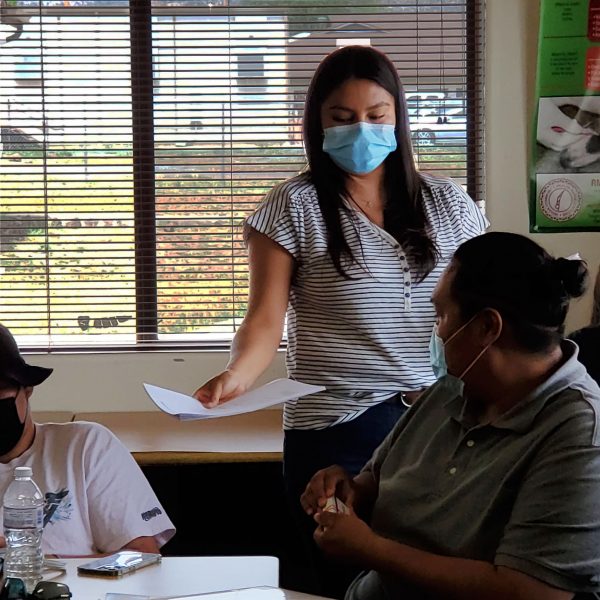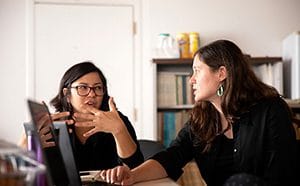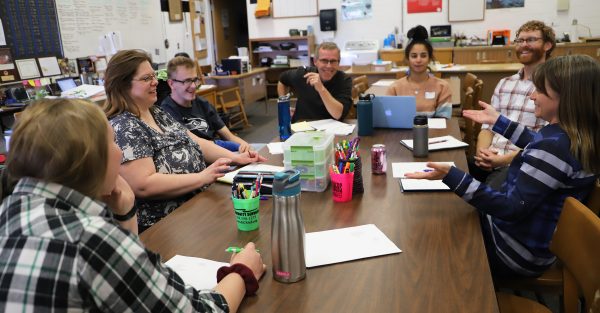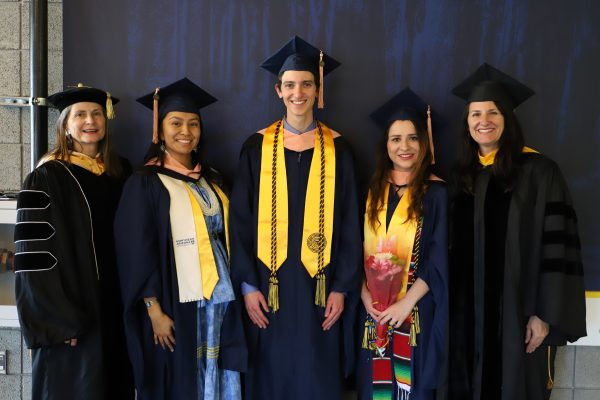
What began as an innovative, ambitious project more than five years ago, the Southwest Health Equity Research Collaborative has now grown into a strong, effective team of faculty, staff, students and community organizations—all working together with a singular purpose—to increase basic biomedical, clinical, and behavioral research at NAU to address health disparities among diverse populations of the southwestern United States.
Under the leadership of Regents’ Professor Julie Baldwin, director of NAU’s Center for Health Equity Research (CHER), SHERC directly supported NAU faculty from all disciplines with funding for an astonishing 72 projects led by NAU researchers—spanning social, behavioral, biomedical and clinical topics—through five main research projects, 20 pilot projects, nine supplements, 16 Community-Campus Partnership Support (CCPS) projects, and 22 Recruitment Core research start-up projects.
SHERC has actively supported 97 NAU faculty members from 28 different departments in the last five years. More than half of SHERC faculty are early-stage investigators (ESIs) and 20 percent self-identify as underrepresented.
Most importantly, 88 percent of SHERC-funded investigators reported that their research projects increased their understanding of trends and drivers of health disparities and assets in the Southwest—a key step in addressing health equity and improving health disparities among diverse populations.
“We believe that SHERC has made a world of difference for ESIs at NAU to really help them launch their research programs,” Baldwin said. “With pilot project funding, our mentoring program, a breadth of methods workshops, training in grant and manuscript writing, and support from our community engagement core to work closely with community-based partners, our ESIs have been incredibly productive and successful over the last five years.”

Morgan Vigil-Hayes, assistant professor, School of Informatics, Computing and Cyber Systems, received SHERC pilot project funding in the center’s second year. She recently received a $2.5 million NSF grant to continue work that started with her SHERC pilot project, “ARORA: Using Augmented Reality to Gamify a Universal Social Emotional Learning Intervention in Low-infrastructure Environments.”
“We would not be at this exciting starting point if it had not been for SHERC,” Vigil-Hayes said.
Vigil-Hayes said that SHERC brought resources together that allowed her to engage with Ann Collier (originally professor, Department of Psychological Sciences at NAU and now at Southcentral Foundation in Anchorage, Alaska) in a new vein of research and assisted her in meeting Darold Joseph (Iswunga), assistant professor, Department of Educational Specialties, and adding him to their team.
“[SHERC] really has helped me develop as an early-career researcher starting down a track of highly interdisciplinary work, and I look forward to continuing to work where this project leads,” Vigil-Hayes said. “Thank you so much to Dr. Julie Baldwin for developing and leading SHERC in such an encouraging way and to the whole SHERC team for their amazing support. It has made an incredible impact on me personally and on the ability of this project to grow.”
Fostering ESI and underrepresented faculty career enhancement

The number of ESIs affiliated with SHERC increased fivefold from 11 in 2017 to 55 in 2022; while the number of underrepresented faculty affiliated with SHERC increased tenfold from two in 2017 to 20 in 2022. A total of 16 SHERC-affiliated faculty were promoted throughout the university. Associate Professor of Anthropology Emery Eaves, who started as a postdoctoral scholar with CHER and who leads a SHERC COVID-19 supplement and pilot is one of those ESIs who works closely with both SHERC and CHER. She said that Baldwin has been a key mentor for her since she started at NAU.
“After I successfully transitioned into a tenure track position in anthropology, Julie has continued to provide mentorship and support, and she has been instrumental to my success as a new researcher,” Eaves said.
Addressing health equity in communities during COVID
When the COVID-19 pandemic reached northern Arizona halfway through SHERC’s five-year funding, NAU faculty immediately turned their collaborative research to serving local communities and obtained three COVID-related SHERC supplements to support the work.
One of the senior NAU faculty members who quickly began serving her community was Karen Jarratt-Snider (Choctaw), professor, Department of Applied Indigenous Studies. She was joined by colleagues Regents’ Professor Julie Baldwin (Cherokee), director of CHER; Nicolette Teufel-Shone, CHER associate director and professor in CHER and the Department of Health Sciences; Manley Begay Jr. (Diné), professor, Department of Applied Indigenous Studies; Darold Joseph (Iswunga), assistant professor, Department of Educational Specialties; Amanda Hunter (Pascua Yaqui), postdoctoral fellow, CHER; Carol Goldtooth (Diné), community health educator; Alisse Ali-Joseph (Choctaw), assistant professor, Applied Indigenous Studies; Chesleigh Keene (Diné), assistant professor, Department of Educational Psychology; Juliette Roddy (Ojibwe), The NARBHA Institute James Wurgler MD Chair of Criminal Justice and Behavioral Health, Department of Criminology and Criminal Justice; Angelina Castagno, professor, Department of Educational Leadership; Marianne Neilsen, professor emeritus, Department of Criminology and Criminal Justice, April Petillo, assistant professor, Department of Sociology; Michael Petillo, CHER senior evaluation coordinator; and Esther Cadman (Diné) and Kelly McCue, CHER senior research coordinators.
The team also included several students: NAU doctoral candidates Melinda Smith (Bitterroot Salish) and Carly Camplain (Comanche), Andria Begay (Diné), doctoral candidate at the University of North Dakota, and Master of Public Health candidate, Amy Gelatt. Recent NAU graduates included: Jennifer Etcitty (Diné), MPH; and undergraduates Kat Evans (Diné), Bachelor of Arts, and Angelica Alvarado, Bachelor of Science.
Continuing undergraduates included Vaneka Hoskie (Diné), Kendra David (Diné), and Allyson Calamayan. Community researchers included Kylene Kochampanasken (Salt River Pima Maricopa Indian Community), Rachel Cuz-Shurz, David Tsosie (Diné), Lendrick Lomayestewa (Hopi), and Esther Yazzie (Diné).
Their supplement, “Understanding Resilience and Mental Wellbeing: Southwest Indigenous Nations and the Impact of COVID-19,” determines the role of Indigenous determinants of health in tribal government policy and action that support Indigenous mental health and well-being, and in turn, resilience during the COVID-19 crisis.
“COVID-19 struck Indigenous nations and communities and their citizens at much higher per capita rates than many other populations in the U.S.,” Jarratt-Snider said. “While everyone suffered during the pandemic, factors that make Indigenous Peoples particularly vulnerable became obvious during the pandemic, such as existing health disparities in areas including diabetes and kidney disease, that left those citizens especially vulnerable to the worst effects of COVID. Other factors, including lack of access to running water, and lack of nearby supermarkets made it difficult for some families to take basic precautions against COVID.”
She said that many households have multiple generations living in the same household in small homes, making it almost impossible for a family member with COVID-19 to isolate and protect the rest of their family.
“Yet despite all these challenges, Indigenous Peoples remained resilient in the face of the pandemic,” Jarratt-Snider said. “This supplement has allowed researchers, working with Indigenous communities, to better understand Indigenous resilience during the pandemic and will allow our findings to be used by Indigenous leaders to help prepare for future pandemics and widespread contagious disease epidemics.”
SHERC-affiliated faculty’s prolific publications and grants

Even while navigating a pandemic, SHERC-affiliated faculty and staff, along with collaborators from across the U.S. and internationally, produced 111 peer-reviewed, SHERC-cited publications; 49 percent included underrepresented authors and 77 percent included ESI authors.
“SHERC has significantly enhanced NAU’s health research capacity through innovative research projects and tailored support for investigators to successfully obtain highly competitive externally funded grants,” said Kelly Laurila, SHERC evaluator. “At the last evaluation checkpoint, SHERC-affiliated faculty had obtained 78 health-related grants worth over $41.6 million.”
Partnerships with NIH Clinical and Translational Science Awards Program affiliates and Research Centers in Minority Institutions colleagues resulted in three collaborative publications.
Heather Williamson, associate professor in CHER and the Department of Occupational Therapy, produced 15 publications through SHERC with colleagues from NAU and other universities throughout the U. S. and internationally.
“It has been a great opportunity for me to access SHERC resources, such as their methodology workshops to help with grant writing and also to receive support from the TAG,” Williamson said. “I was also able to receive a CCPS grant to help build relationships with community partners that eventually led to the successful receipt of extramural funding. In addition, my involvement in SHERC has allowed me to collaborate with other faculty across campus.”
SHERC supports faculty, staff, and student hiring
SHERC used Recruitment Core funds to support two new tenure-track faculty hires: Amanda Pollitt, assistant professor in CHER and the Department of Health Sciences, and Linnea Evans. Pollitt recently received an NIH R03 award and is now mentoring graduate students in interdisciplinary health Jeffersson Brasil Pires Dos Santos and recent doctoral graduate Shaylynne Shuler.
Alumni from the Master of Public Health and Doctorate in Interdisciplinary Health who now work at SHERC include Gelatt, Chassity Begay (Diné), Skyler Bordeaux (Sicangu Lakota), Omar Gomez, Dulce Jimènez, Taylor Lane, Alexandra Samarron Longorio, Grant Sears, Marissa Tutt (San Carlos Apache) and Janet Yellowhair (Diné), and current doctoral students Camplain, Smith, Rebecca Annorbah, Kate Compton-Gore, Christine Kirby and Travis Pinn.

Impacts on NAU’s physical space
In its first year, SHERC funded the renovation of the anthropology laboratory building on campus which has had an ongoing impact on cross-disciplinary, health-focused programs at NAU. The renovations brought this extremely underused building—primarily used for storage before the renovation—into effective, functional research use.
Melissa Liebert, assistant professor, Department of Anthropology, works in the renovated lab, and took part in the lab’s overhaul.
“As an ESI, SHERC funding for the Anthropology Laboratories was pivotal for launching my research career at NAU,” Liebert said. “This support offered newly renovated facilities for me to develop the Human Biology and Health Laboratory, provided a secure space for the management of sensitive data, and funded the purchase of important research equipment.”
“The renovations have further allowed me to provide exciting research opportunities in biocultural anthropology and human biology for NAU undergraduate and graduate students,” she added.
Increasing interest and education on health equity research in the Southwest
During the past five years, SHERC has offered more than 97 workshops, seminars and networking events, with more than 2,200 people attending.
The Community Engagement Core (CEC) created the Fairness First Campaign to promote broad community participation in SHERC research activities and reaching 840 people to date through podcasts, events and blog features.
The Technical Assistance Group (TAG), begun in the Research Infrastructure Core (RIC), supported 96 consultations supporting 35 grant proposals and 12 manuscripts. Investigators engaging in biomedical, clinical, and behavioral research at NAU to address health disparities among diverse populations can receive TAG consultation funding.
This research is supported by a NIMHD center grant to the Southwest Health Equity Research Collaborative at Northern Arizona University (U54MD012388).